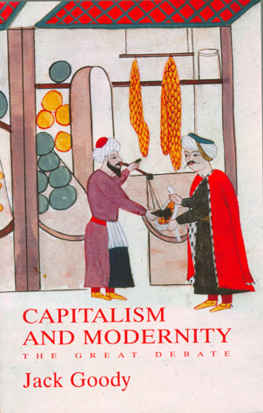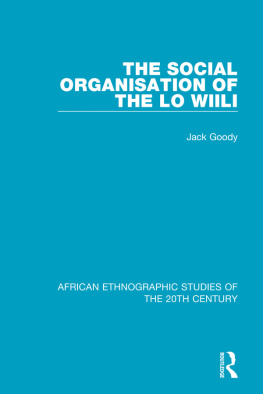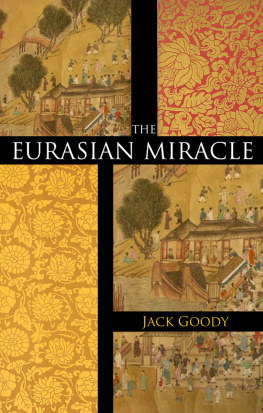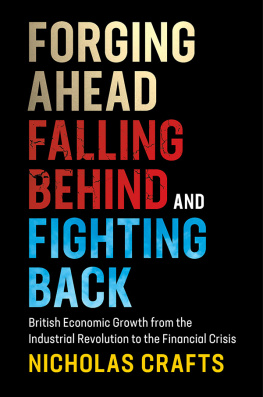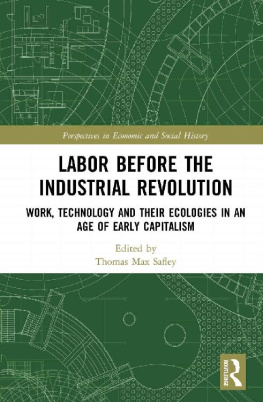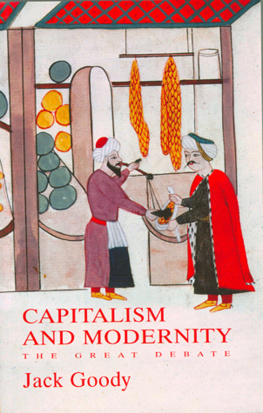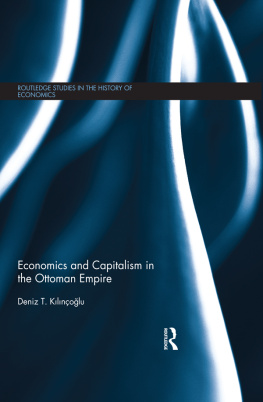If I were to list all those who have helped to focus my attention on the problems discussed in this book, the manuscript would be very much longer than it is, and it would include a number of the names whose work has been the subject of my comments. For it is an essay by a generalist, intended for the general reader, and I am therefore especially indebted to friends, acquaintances and, above all, peoples books. I would like particularly to thank those associated with the Cambridge Group for the Study of Population and Social Structure, in particular the late Peter Laslett and Tony Wrigley, as well as my former colleague Alan Macfarlane. The help I have received on China from Joe McDermott and Francesca Bray is obvious, as is that on Venice from Deborah Howard and on Bologna from Carlo Poni; Christine Oppong ( ne Slater) took me to the early Slater mill near Providence, Rhode Island. Keith Hart gave me valuable comments on chapter 6. I am very grateful to Juliet Mitchell for her help with this and all my recent publications.
I am also grateful to the anonymous readers for Polity Press whose comments were most helpful. The chapter on Malthus (chapter 4) is based upon a paper contributed to the conference of the International Union for the Scientific Study of Population in Florence in 1999 which was devoted to assessing developments in population studies covering the last millennium; it is being published by them in the conference proceedings. The section on Landes was based upon an article in the Neha-Jaarboek (Amsterdam, 2001: 6174). Those on Andr Gunder Frank and Kenneth Pomeranz were based on pieces in the Times Higher Education Supplement (23 October 1998, p. 28, and 3 November 2000).
Introduction: the Notion of Capitalism and the Rewriting of World History
Every nation , whether Greek or barbarian, has the same conceit that it before all other nations invented the comforts of human life.
Vico, The New Science , 1744, Axiom 125
Throughout the world historians and social scientists are involved in the debate about modernization, industrialization and capitalism. All recognize that Europe (including Anglo-America) has outstripped all other continents in economic growth since the nineteenth century; now some others are catching up. But there consensus rests. The timing of this initial occurrence and the reasons for the delay in other areas are the subject of great debate. Before turning to the timing and nature of European advantage, let us consider what is understood by the large-scale processes of capitalism, modernization and industrialization by which it is often characterized.
The contemporary world has been seen as marked by the advent of these overlapping but not identical features, the claims for which I want to try to examine (and to disentangle) from a broad comparative point of view. My approach includes some acquaintance with other Eurasian cultures and their history but also derives from a very different type of experience as a field anthropologist in Africa.
Let me begin with capitalism, a concept that has been used in many ways. Pirenne defines capitalism in very general terms as the tendency to the steady accumulation of wealth and sees this as a characteristic of European merchants of the twelfth and thirteenth centuries, Freedom is not a quality invented by the modern West, whatever readers of Adam Smith may conclude, nor yet is the rule of the people (democracy), though the particular type of numerical election system used for consulting them is.
Heilbroner writes of capitalism that the wagelabour relationship appears not as means for the subordination of labour but for its emancipation, for the crucial advance of wage-labour over enslaved or enserfed labour lies in the right of the working person to deny the capitalist access to labour-power. I have elsewhere told the story of showing an African chief or headman round Pyes factory in Cambridge (now Philips), where women were lined up assembling radio sets. On the wall hung a clock where the workers punched in the times of their coming and their going. My companion turned round to me in surprise and asked in his native language, Are these slaves? He was used to a much more individualized form of work organization, where he himself decided when to go to and when to leave his farm. So it is not capitalism that institutes freedom but the absence of oppression, whether political or economic. That situation can well exist under other regimes.
The other feature attributed to capitalism has been the development of a form of rationality based on the calculation of the meansend relationship. It is true that mercantile groups are necessarily much given to the calculation of profit and loss, and rationality of that kind may be less characteristic of earlier elites. Nevertheless the idea that farmers, for instance, however simple their techniques, do not make rational calculations is unacceptable and part of discredited views of the irrationality of earlier, especially primitive, societies.
Another aspect of the culture of capitalism has been seen as the pluralism of capitalist ideologies as against the earlier monolithic character of belief, especially in allowing for the demystification of the world and the growth of scientific explanations. Both these processes are amply evident in Europe following the Renaissance and the growth of humanism. While the tempo of such processes undoubtedly increased at this time, such features existed earlier. I have argued that an element of disbelief, of agnosticism, is found even in the simplest societies. remarks, and Judaism its Enlightenments and its Golden Ages. To this important point I will return later, but we may perhaps see these cultural changes, innovatory in character, as being largely independent of the process of rapid accumulation known as capitalism which they preceded.
That judgement, however, depends very much on what system of periodization we adopt, and here I am concerned with industrial capitalism. Periodization was discussed by the German economist Werner Sombart (18631941), who drew a distinction between early capitalism, high capitalism and late capitalism (191627, 1930). High capitalism corresponds to the coming of the Industrial Revolution, which he dates around 1760. Late capitalism follows the First World War, later than what others have called the Second Industrial Revolution (about 1880) and later too than Lenin envisaged by imperialism; some have spoken of late capitalism as state capitalism. The limits of the early period, in which Sombart was interested in the role of the Jews and Italians, are always vague. Some characterize it as late mercantile or pre-industrial, some see it as going back to the Renaissance and the Age of Exploration in Europe, whereas others go back to the Middle Ages, some further back still to the classical period. Yet others have seen the shoots of capitalism not only in the East but more surprisingly in the market and artisanal activity of Africa, societies which had not even experienced the Bronze Age. Since my enquiry is directed to the Eurocentric roots of the debate, I will begin with the claim for early Europe.

